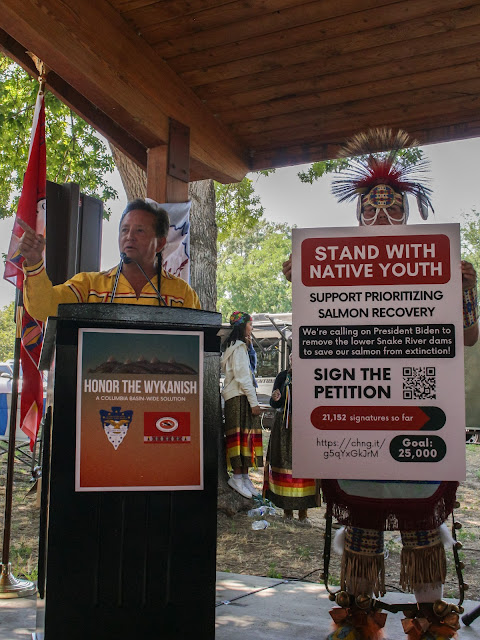Yakama and Umatilla Tribes unite for comprehensive salmon recovery
Tribes call for inclusive solutions to saving Columbia Basin salmon
Contact:
Andrea Tulee, Public Information Officer
Andrea_Tulee@Yakama.com
Kaeleen McGuire, Public Relations Specialist
KaeleenMcGuire@ctuir.org
PRESCOTT, Washinton –– On Tuesday, Aug. 9, tribal leaders from around the Pacific Northwest gathered at Fishhook Park to advocate for working together to restore Columbia Basin salmon populations. The event highlighted the power of partnerships in finding comprehensive solutions to salmon recovery.
Leaders from Yakama Nation and the Confederated Tribes of the Umatilla Indian Reservation (CTUIR) celebrated the role of salmon in Northwest Native cultures and recommended taking immediate action to ensure endangered salmon do not go extinct.
The tribes also advocated for a comprehensive fish restoration strategy, which included considering breaching the four lower Snake River dams. They noted that tribes regularly work with non-Native communities to find collaborative solutions to challenges in the region—and they can do so again to keep these vital fish from disappearing forever.
Leaders honored the wykanish (salmon) and called for the protection of tribal treaty rights. Speakers also highlighted the need to ensure a robust future for agriculture without the dams on the lower Snake River.
“Salmon are sacred to us. Stand with our tribes. Save our salmon,” said Yakama Nation Councilmember Jeremy Takala. “Through collaboration and community we can protect our guaranteed treaty rights. As Salmon People, we will honor the wykanish by advocating for comprehensive solutions.”
During the event, Yakama Nation elder Carrie Schuster Nightwalker spoke of the history of Fishhook Park as a place for tribes to come together. Tribal leaders emphasized the vital connection between salmon and Pacific Northwest tribes.
“Our salmon are on the brink of extinction,” said Corinne Sams, CTUIR Board of Trustees member. “It is our obligation to ensure salmon are here for generations to come. The reality is, our salmon are deteriorating and for far too long our salmon and treaty rights have been threatened. This is unacceptable. Who are we without salmon?”




No comments:
Post a Comment